|
|
|
|
The ocean is a pretty remarkable thing, and yet many of us who live inland pay little attention to it. The ocean is responsible for the air we breathe and the rain and snow that replenish our glaciers and irrigate our crops. It also regulates the planet’s climate, sucking up greenhouse gases that would otherwise raise temperatures to truly unbearable levels.
And yet, noisy ships and industrial activities are drowning out the sounds marine species need to communicate and find their way. Rising sea temperatures are transforming healthy ecosystems into baked and barren landscapes. And the ocean economy often seems to focus on how we can pull resources out of the ocean, whether they’re fish, metals or oil, rather than taking a more sustainable approach.
Today at The Conversation Canada — and across our global network — we’re celebrating World Oceans Day and the UN Decade of Ocean Science for Sustainable Development. Follow our international series Oceans 21 to learn more about South Africa’s sharks, seabird journeys, fish farm viruses, the “blue economy” and much more. You can also tune into a webinar on the state of the world’s ocean — and its future.
Also today:
|
Hannah Hoag
Deputy Editor | Environment + Energy Editor
|

|
|
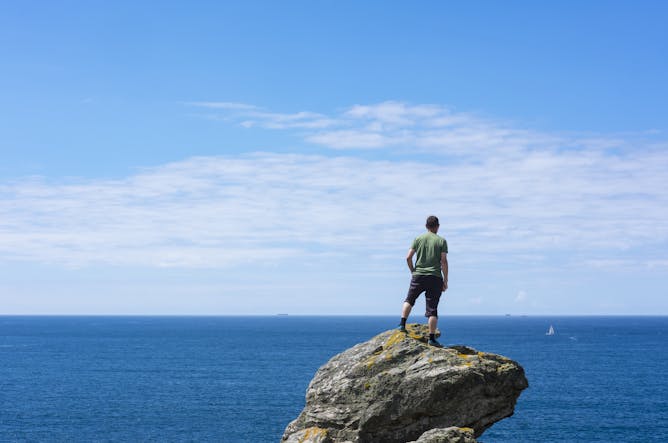
The ocean is the architect of all life on Earth. It provides nearly all the rain and snow that falls on land, and regulates the climate.
(Shutterstock)
Josep Lluís Pelegrí Llopart, Instituto de Ciencias del Mar (ICM-CSIC)
The oceans play a key role in regulating life on Earth. We must shift our view of them from as something to use if we hope to development them sustainably.
|
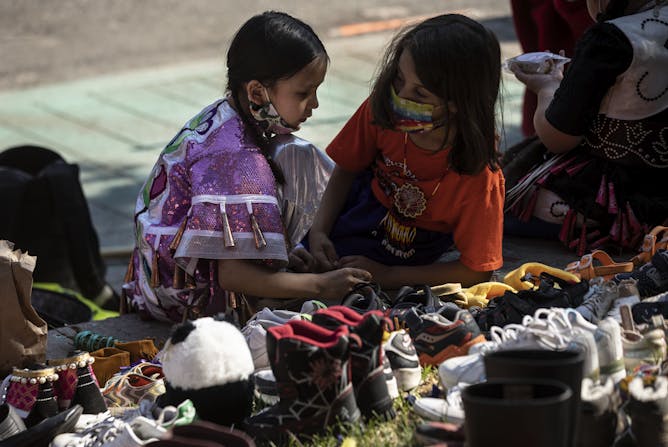
Two young children sit next to shoes left in front of a statue of Egerton Ryerson, who was instrumental in the design and implementation of the Indian Residential School System.
THE CANADIAN PRESS/Chris Young
Beverly Jacobs, University of Windsor
An Indigenous lawyer makes the case that what happened to Indigenous children who went to residential schools is genocide and the case should be tried by the International Criminal Court.
|
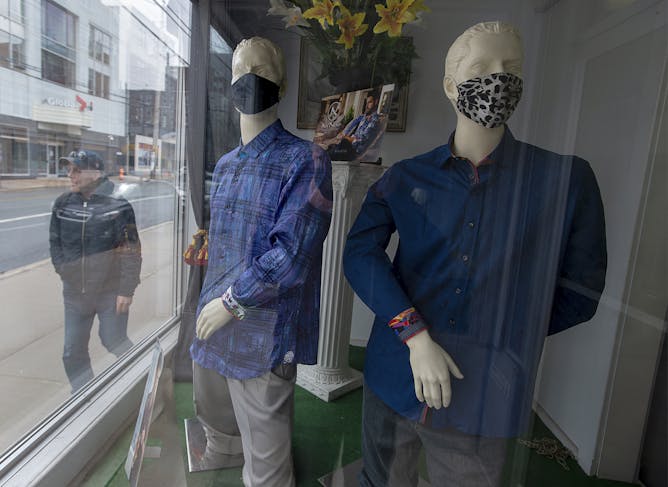
A man heads past a clothing store where mannequins sport face masks in Halifax. Retail workers, long-term care workers and teachers say the media has failed to reflect their pandemic experiences.
THE CANADIAN PRESS/Andrew Vaughan
Elisabeth Rondinelli, Acadia University; Rachel K. Brickner, Acadia University; Rebecca Casey, Acadia University
In post-pandemic Canada, the media will play a big role in shaping public understanding of labour conditions. A future of work that is safe and equitable requires the voices of workers.
|
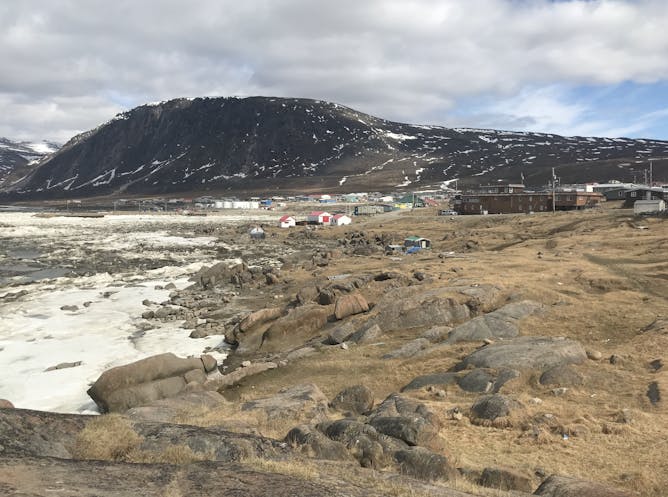
Inuit in the Qikiqtaaluk (Baffin) region must travel long distances south to receive specialized health-care services.
(Janet Jull)
Janet Jull, Queen's University, Ontario; Inuit Medical Interpreter Team; Malaya Zehr, Queen's University, Ontario; Mamisarvik Healing Centre, Tungasuvvingat Inuit
Inuit living in their traditional territory must travel long distances — often with no personal support — for specialized health-care services like cancer care, obstetrics and dialysis.
|

Would anyone want to spend more screen time talking about pandemics? Yes, learned an anthropologist, biologist and historian who developed a course on the topic.
(Shutterstock)
Elizabeth Finnis, University of Guelph; Sofie Lachapelle, University of Guelph; T. Ryan Gregory, University of Guelph
The course offers a model for teaching about complex problems, and underlines the critical role of university learning, research and outreach in understanding and addressing them.
|

Phil Mickleson uses a rangefinder at the PGA Championship golf tournament.
(AP Photo/Chris Carlson)
Heather F Neyedli, Dalhousie University; Ben Rittenberg, Dalhousie University; Bradley W. Young, L’Université d’Ottawa/University of Ottawa; Lori Dithurbide, Dalhousie University; Ryan J Frayne, Dalhousie University
How psychological factors may have influenced the opinions about the of use of rangefinders during the 2021 PGA championships.
|

It’s challenging to make virtual assistants sound natural and conversational?
(Shutterstock)
Dongwook Yoon, University of British Columbia; Joanna McGrenere, University of British Columbia
As the use of virtual assistants like Siri and Alexa expand in homes and workplaces, designers are working to make voice exchanges more natural.
|
La Conversation Canada
|

Dans le domaine médical, des recherches ont montré que les femmes devaient publier un plus grand nombre d'articles que les hommes dans des revues prestigieuses ou spécialisées afin d’être perçues comme étant compétentes par les évaluateurs.
(Shutterstock)
Thomas Rajotte, Université du Québec à Rimouski (UQAR); Charlaine St-Jean, Université du Québec à Rimouski (UQAR); Marilyn Dupuis Brouillette, Université de Sherbrooke
Plusieurs études ont permis de relever que la présence du chromosome « Y » dans le code génétique du demandeur d’une subvention de recherche influence le financement de ses projets.
|

La stigmatisation liée au poids est à la fois une injustice sociale et un problème de santé publique.
(SIPhotography/Getty Images)
Rebecca Puhl, University of Connecticut
Les préjugés à l'égard des personnes de forte taille ou obèses sont répandus en Australie, au Canada, en France, en Allemagne, au Royaume-Uni et aux États-Unis.
|
Oceans 21
|
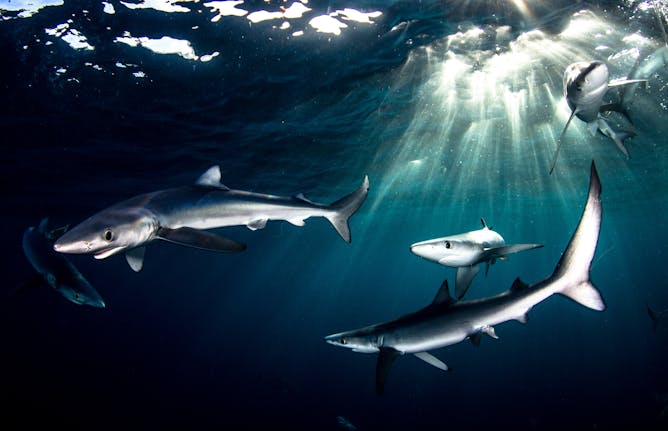
Blue sharks, which are prized for their fins, swimming off Cape Point in South Africa.
Morne Hardenberg
Alison Kock, South African Institute for Aquatic Biodiversity
Sharks grow slowly and produce few young compared to bony fishes. In many cases, this means that their populations are fished out faster than can be replenished if not well managed.
|
Science + Technology
|
-
Jenna Crowe-Riddell, University of Michigan
During mating season, a male turtle-headed sea snake will often lose sight of the female before mating can happen. The female may be metres away, but the male won't ever find her again.
|
|
Arts
|
-
Rebecca Janzen, University of South Carolina
The latest movie to take on this classic story sentimentalizes history in the name of inspiring religious devotion.
|
|
Culture + Society
|
-
Patricia Francis, Nottingham Trent University
When the movement made its way from the United States in 2016, it wasn't met with nearly the same amount of support we see today.
|
|
| |
| |
| |
| |
| |
| |
|
|
|
|
|
|
|